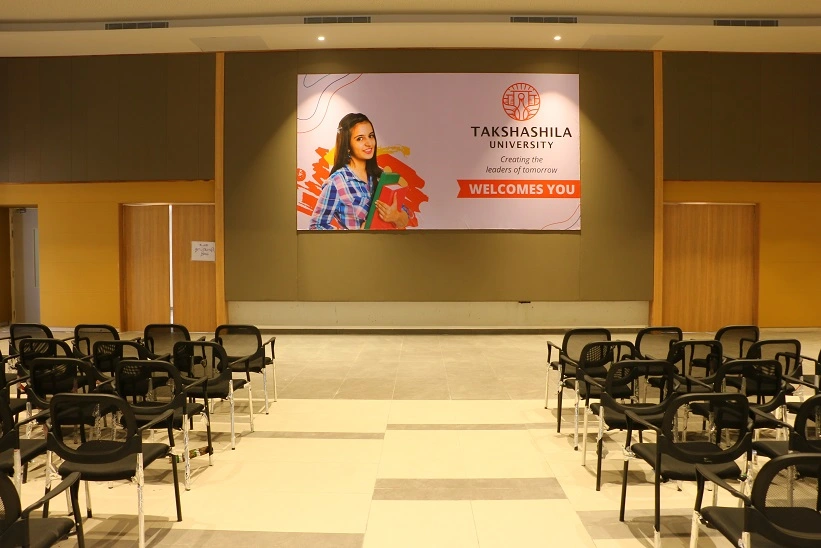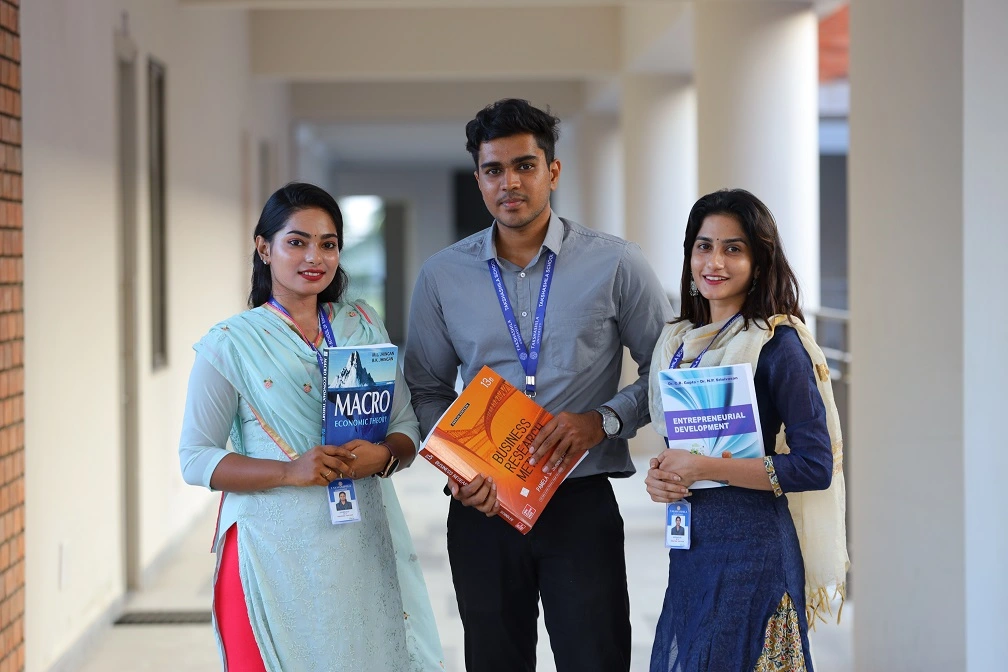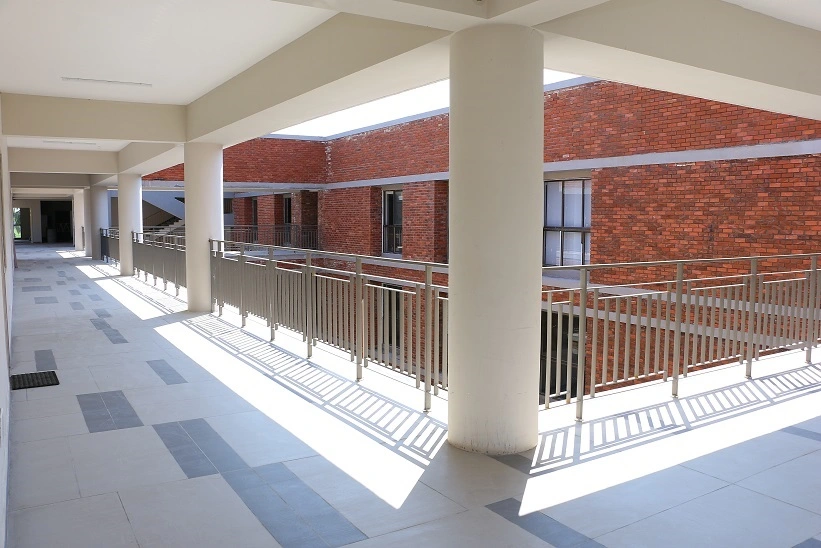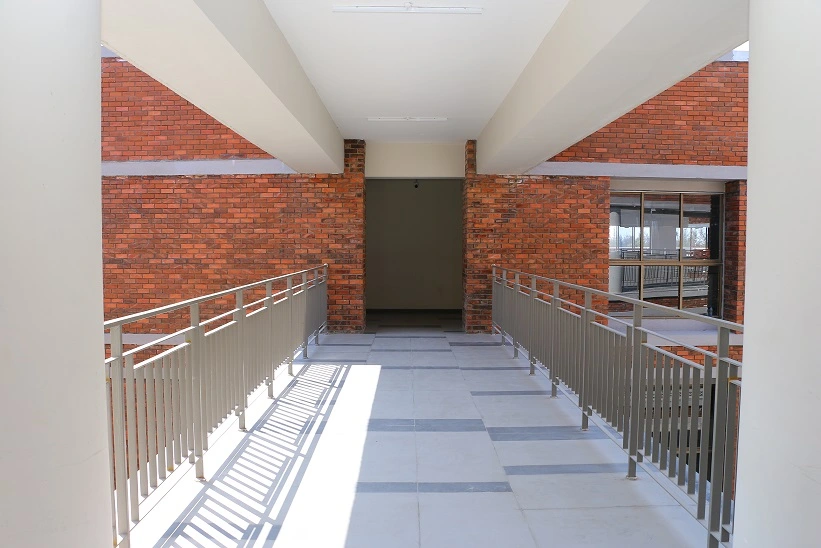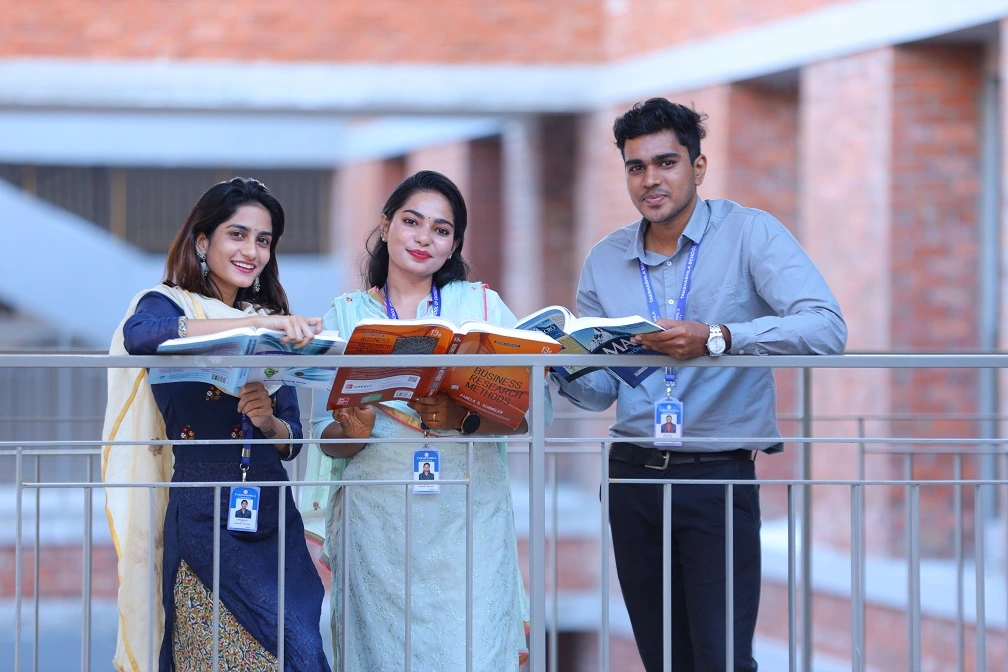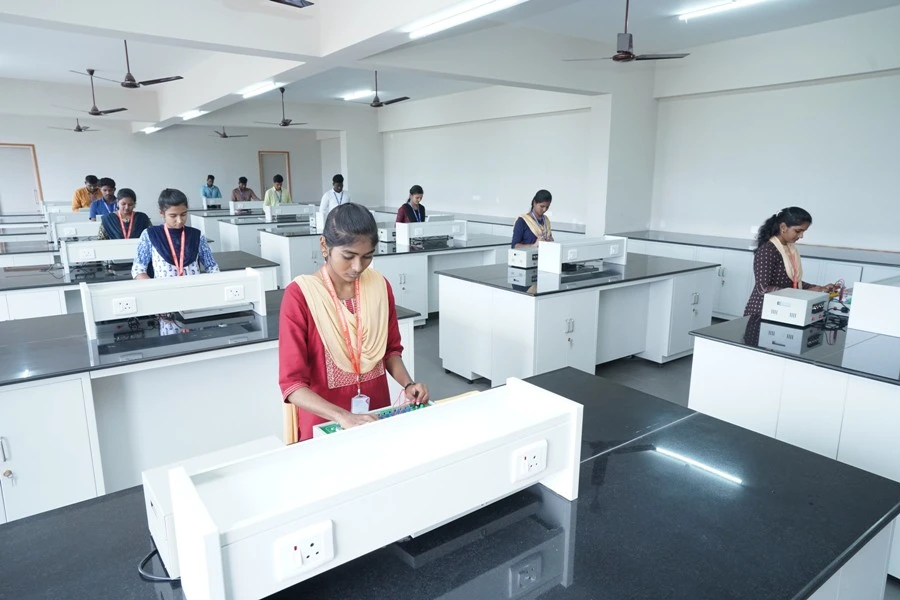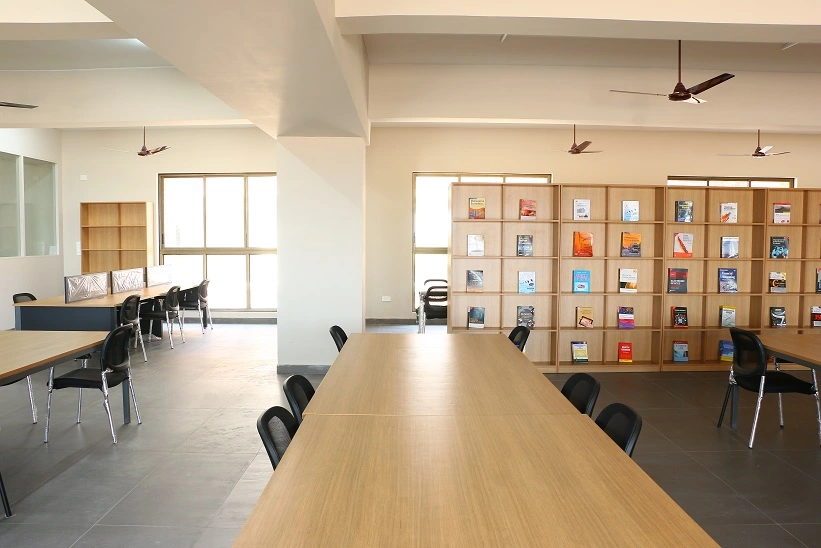B.Sc. Radiography and Imaging Technology
- Hands-on Training
- Faculty with International Experience
- Advanced Curriculum
- Upto 100% Scholarship based on merit

About the Course
The B.Sc. in Radiography and Imaging Technology at Takshashila University is a 3-year undergraduate programme that trains students to become proficient in using diagnostic imaging techniques to assist in medical diagnosis. Radiographers and imaging technologists play a critical role in healthcare by performing procedures such as X-rays, CT scans, MRIs, and ultrasounds, helping physicians identify, monitor, and treat various medical conditions. This course combines theoretical knowledge with practical training, preparing you to work with state-of-the-art imaging equipment and contribute to patient care in hospitals, clinics, and diagnostic centres.
Course Curriculum

Year 1
The first year covers the fundamental principles of human anatomy, physiology, and medical imaging. You will study the basics of radiography, including the techniques used in imaging and the importance of patient care. You will also learn about radiation safety and imaging equipment.
Key Subjects: Anatomy and Physiology, Introduction to Radiography, Radiation Physics, Imaging Equipment and Techniques, Radiation Safety, Medical Terminology.
Year 2
In the second year, you will delve deeper into various imaging modalities, including X-ray, ultrasound, and MRI. The focus will be on developing practical skills and understanding the technical aspects of different imaging systems. You will also study the legal and ethical aspects of radiographic practice.
Key Subjects: Radiographic Techniques, Ultrasound Imaging, MRI Principles and Techniques, X-ray Imaging, Ethical and Legal Issues in Radiography, Patient Care and Positioning.
Year 3
The final year focuses on advanced imaging techniques, including CT scans and fluoroscopy. You will also engage in hands-on training through clinical internships, gaining real-world experience in a diagnostic setting. The focus will also be on quality control and the management of imaging departments.
Key Subjects: Advanced Imaging Techniques (CT and Fluoroscopy), Imaging in Specialised Areas (Pediatrics, Orthopaedics), Image Interpretation, Radiographic Quality Control, Clinical Internship, Project Work.
Programme Outcomes (POEs)
Upon completing the B.Sc. in Radiography and Imaging Technology, you will have developed the following competencies:
Proficiency in Imaging Techniques
You will be able to perform a wide range of imaging procedures, including X-rays, MRIs, CT scans, and ultrasounds, ensuring high-quality diagnostic images.
Patient Positioning and Care
You will learn to position patients correctly for imaging procedures, ensuring comfort, safety, and effective imaging results.
Radiation Safety and Protection
You will acquire knowledge of radiation safety standards and protocols, ensuring both patient and staff safety during imaging procedures.
Image Interpretation and Quality Control
You will develop the ability to interpret diagnostic images and ensure the quality of images meets medical standards, contributing to accurate diagnoses.
Clinical Competence
You will gain hands-on experience through clinical placements, working in real-world healthcare settings and applying your learning under supervision.
Professionalism and Ethics
You will learn to adhere to ethical and professional standards in radiography, ensuring patient confidentiality and quality of care.
Programme Outcomes (POs)
The B.Sc. in Radiography and Imaging Technology will help you achieve the following broader learning outcomes:
PO1: Expertise in Imaging Procedures
You will gain expertise in performing various imaging techniques, including X-ray, MRI, ultrasound, and CT scans, contributing to accurate diagnosis and treatment planning.
PO2: Understanding of Radiologic Technology
You will gain a deep understanding of radiologic technology, including the principles behind various imaging systems and their application in diagnosing medical conditions.
PO3: Knowledge of Radiation Safety
You will become proficient in radiation safety, ensuring that patients and healthcare professionals are protected during diagnostic imaging procedures.
PO4: Effective Patient Communication
You will develop strong communication skills, ensuring that you can explain imaging procedures to patients clearly and help them feel comfortable and safe.
PO5: Quality Control in Imaging
You will be trained in performing quality control checks on imaging equipment, ensuring the accuracy and reliability of diagnostic images.
PO6: Professional Conduct and Ethical Practice
You will learn to practice ethically, adhering to legal requirements and maintaining patient privacy and confidentiality.
Programme Specific Outcomes (PSOs)
Through this programme, you will develop the following specific competencies:
PSO1: Specialisation in Advanced Imaging Techniques
You will gain expertise in advanced imaging techniques such as CT scans, MRIs, and fluoroscopy, preparing you for specialised roles in medical imaging.
PSO2: Radiographic Equipment Handling
You will develop proficiency in handling and operating modern radiographic equipment, ensuring efficient and effective imaging procedures.
PSO3: Image Interpretation
You will learn to analyse and interpret medical images, helping physicians make accurate diagnoses and treatment decisions.
PSO4: Patient Care in Imaging
You will acquire the skills to care for patients before, during, and after imaging procedures, ensuring their comfort and safety.
PSO5: Radiology Department Management
You will learn the basics of managing a radiology department, including equipment maintenance, team coordination, and patient workflow management.
PSO6: Research in Radiography and Imaging
You will gain the ability to participate in research to improve imaging techniques, equipment, and diagnostic processes in radiology.
Career Scope
Graduates of the B.Sc. in Radiography and Imaging Technology will be well-equipped to pursue careers in hospitals, diagnostic centres, imaging departments, and research institutions. Career opportunities include:
Radiographer
- Role: Perform diagnostic imaging procedures, including X-rays, CT scans, MRIs, and ultrasounds, to assist in the diagnosis and treatment of medical conditions.
- Salary: ₹4,00,000 to ₹8,00,000 per annum.
Radiology Technician
- Role: Operate radiologic equipment, prepare patients for imaging procedures, and assist in the interpretation of diagnostic images.
- Salary: ₹3,50,000 to ₹7,00,000 per annum.
CT Scan Technician
- Role: Specialise in operating CT scanners to capture cross-sectional images of patients' internal structures.
- Salary: ₹4,50,000 to ₹8,00,000 per annum.
MRI Technologist
- Role: Perform MRI scans to capture high-resolution images of patients’ internal organs and tissues.
- Salary: ₹5,00,000 to ₹9,00,000 per annum.
Ultrasound Technician
- Role: Use ultrasound equipment to capture images of organs and tissues, assisting in the diagnosis of conditions such as pregnancy, heart disease, and abdominal disorders.
- Salary: ₹4,00,000 to ₹7,00,000 per annum.
Radiology Researcher
- Role: Conduct research in the field of radiology, exploring new imaging techniques, equipment, and technologies to improve patient diagnosis.
- Salary: ₹5,00,000 to ₹12,00,000 per annum.
Why TAKSHASHILA?

Comprehensive Curriculum
The B.Sc. in Radiography and Imaging Technology offers a well-rounded curriculum that includes both theory and practical training, ensuring you gain all the necessary skills for your career.
State-of-the-Art Facilities
Access to modern imaging labs and equipment allows you to gain hands-on experience with the latest radiographic technology.
Industry Collaborations
Our partnerships with leading healthcare institutions provide you with opportunities for clinical exposure and internships in top diagnostic centres.
Experienced Faculty
Learn from industry experts who bring both theoretical knowledge and practical insights into the classroom.

- Applicants must have completed their 10+2 or equivalent with a minimum of 50% marks in Physics, Chemistry, and Biology.
- Entrance exams or personal interviews may be required as part of the selection process.

For All Programmes except MBA, MCA, M.Tech, and Integrated Programmes offered by Sunstone, FacePrep, Kalvium and NxtWave
|
S.No |
% of Marks |
Scholarship Amount in Tuition Fees per year |
|
1 |
60% – 75% |
10% |
|
2 |
Above 75 % – 90 % |
25 % |
|
3 |
Above 90 % |
50 % |
Calculation of percentage of Marks (+2 of HSC / 2nd Year of APBIM or +2 of CBSE or Equivalent)
- Engineering – Average marks in Mathematics, Physics, Chemistry/Computer Science
- Lateral Entry – Average marks in Diploma Programme.
- Agriculture – Average marks in Physics, Chemistry, Biology / Botany &Zoology
- AHS / BPT / Pharmacy – Average marks in Physics, Chemistry, Biology / Botany &Zoology/Bio Tech
- UG – Arts & Science / Hotel Management – Overall +2 marks – (+2 of HSC / 2nd Year of APBIM or +2 of CBSE or Equivalent)
- PG – Overall % in UG
- Diploma – Average mark in 10th /Equivalent
MBA, MCA, M. Tech, and Integrated Programmes offered by Sunstone, FacePrep, Kalvium and NxtWave – No Academic Scholarship applicable.
Student Experience at Takshashila University
At Takshashila University, the B.Sc. in Radiography and Imaging Technology provides an engaging and hands-on learning experience. You will have access to advanced imaging labs, participate in clinical placements, and receive mentorship from experienced faculty.
What you can look forward to

Hands-On Learning
Work with state-of-the-art imaging equipment and gain practical experience in radiographic procedures.

Clinical Placements
Gain real-world experience through internships at leading hospitals and diagnostic centres, applying your knowledge to real-life patient care.

Collaborative Environment
Work with peers and healthcare professionals, learning valuable teamwork and communication skills.

Research Opportunities
Engage in research projects to improve imaging techniques, technologies, and patient care in the field of radiology.
Spread over 150 acres
At Takshashila University, you will have ample opportunities to hone your skills in real-world healthcare settings, utilising state-of-the-art medical facilities and simulation labs on our 150-acre campus.
Start your journey towards becoming an expert in radiography and medical imaging!
Frequently Asked Questions (FAQs)
What is the duration of the B.Sc. in Radiography and Imaging Technology?
The course lasts for 3 years, divided into six semesters.
Do I need prior experience in radiography to apply?
No, prior experience is not required. The programme will provide comprehensive training in all aspects of anaesthesia and surgery.
What career support is available after graduation?
Takshashila University provides job placements, internships, and career counselling to help you start your career in radiography.
Is the B.Sc. in Radiography and Imaging Technology internationally recognised?
Yes, the programme is designed to meet global healthcare standards, ensuring you are well-prepared for international career opportunities.

